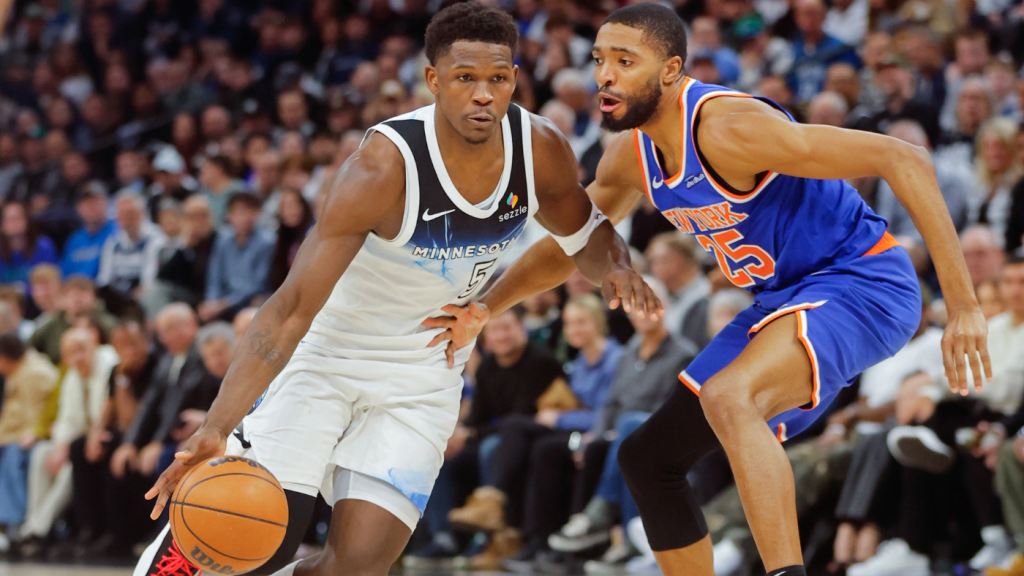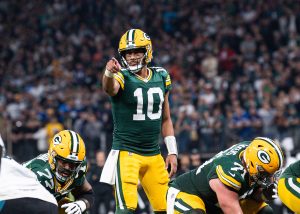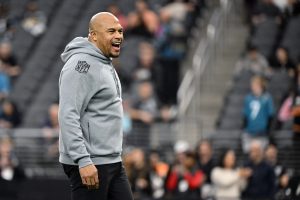Minnesota trailed by as many as 36 in a blowout loss to the Knicks on Thursday
USATSI
Anthony Edwards did not sound particularly surprised that his Minnesota Timberwolves struggled to score on Thursday.
“We’re not an offensive team,” the star guard told reporters after the Timberwolves’ 133-107 loss against the New York Knicks. “We’re a defensive team, so I don’t think there’s going to be too much change. I think we just gotta play defense better.”
Twenty-six games into the season, Minnesota’s offense ranks No. 21 in the NBA. The team had won six of seven games before the ugly performance against New York, but that was a result of stingy defense. During that 6-1 stretch, which followed Edwards calling the team “soft,” the Wolves scored just 105.7 points per 100 possessions. (Only the Washington Wizards have scored less efficiently than that on the season.) That is not a sustainable formula, so Minnesota has to hope that Edwards is wrong about the offense.
Early on against New York, it didn’t seem like the Wolves would have any issues scoring. Julius Randle started the game with two straight jumpers against his former team, then Jaden McDaniels made a 3 and a runner on their next two possessions. Randle put up 13 points in a little more than six minutes, and Minnesota had a 33-32 lead going into the second quarter.
The Knicks went on a 37-8 run in the first nine minutes of the second quarter, though, and Randle cooled off significantly. Edwards, who is averaging 25.9 points per game, finished with 17 points on 7-for-16 shooting. The Wolves trailed by as many as 36 points.
Asked about Minnesota’s identity on offense, Edwards said: “Yeah, we don’t have shit on offense. We don’t have no identity. I mean, we know I’m going to shoot a bunch of shots, we know Ju going to shoot a bunch of shots and that’s all we know. We don’t really know anything else. I mean, it’s not on the coaches at all, it’s on us. We’re out there playing. But we gotta make it easier for each other. Coach has put us in great positions, too, man. We just don’t do it.”
Asked what he wanted to see from the team offensively, Edwards said: “They’re not going to like what I say, so I’m just going to keep my answer to myself.” Then he laughed.
Edwards took some responsibility for Minnesota’s lack of ball movement in the second quarter. “I play a part in the no-pass offense,” he said. “A lot of us do. And I think that really happens when the lead starts to get out of hand. But we just gotta trust it, you know what I mean?”
He lamented, though, that the team isn’t spacing the floor well enough. With the departure of Karl-Anthony Towns, who scored 32 points on 10-for-12 shooting and grabbed 20 rebounds in his first game in Minneapolis as a visitor, it has been easier for the Wolves’ opponents to load up against Edwards this season.
“If you watch the game, it’s nothing for me to do when I get downhill,” Edwards said. “Everybody wants me to get downhill. I know that’s my strength, I get to the rim, lay the ball up, dunk the ball, but I can’t do that if it’s no lane, it’s not open. Every team we play did a great job of sitting in the gaps, [and] when I get to the rim, putting four people at the rim. So I’m sorry, people. There’s nothing I can do about going to the hole right now.”
Minnesota guard Mike Conley credited the reserve unit that played in garbage time — Rob Dillingham, Donte DiVincenzo, Terrence Shannon Jr., Josh Minott and Luka Garza — for doing “all the stuff we preach in practice.” The implication was that the starters could learn a thing or two from them.
“I think our spacing needs to be at an elite level for anything to function well,” Conley told reporters. “But [we need] a lot more cutting, a lot more energy into that. Creating layups, creating 2-on-1 opportunities just by guys putting their bodies on the line and sacrificing that aspect of the game, moving the ball, just trying to keep the ball moving and not sticking on one or two guys.”
Conley said that, if the Wolves are more intentional about their spacing, the decisions that Edwards and Randle have to make will be clearer.
“Too many times, we have two or three guys cluttered up in the corner or at the top of the key,” Conley said. “On a fast break, we’ve got three guys running on the right side and nobody on the left side. We have to be able to space the floor correctly all the time to be a really good offensive team because that’ll lead to easy buckets.”
Minnesota coach Chris Finch told reporters that Minnesota has “shown flashes” on offense, but “we gotta sustain it, and when things get hard, we gotta stick with it.” He said he was “trying to call a lot of sets” when the game went sideways, but nothing really worked. The Wolves went into isolation mode, “which has been a habit of ours,” he said, and, “when we did stay in the flow, we missed some looks.” In the second quarter, they let go of the rope.
“We’ve tried to put more movement into our stuff,” Finch said, “and we didn’t really see that a lot tonight.”
Finch said that Minnesota needs to “get downhill with the mentality to create for others, rather than [get] downhill with the mentality to try to score over multiple people at the basket.” By virtue of their personnel, the Wolves are not going to have pristine spacing this season, but that’s no excuse for selfishness or sloppiness. Even if they’re not an above-average offensive team, they need to believe they can do better than this.
“We know what works,” Finch said. “When we move the ball early and we get other guys involved, then shots will open up.”












